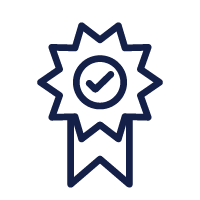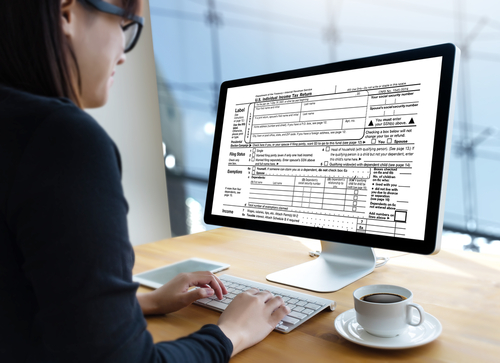
You've passed the CPA Exam, completed your education and experience requirements, and earned the most prestigious three letters in the industry after your name. But the work doesn't end after you're officially a Certified Public Accountant. You'll need to complete a specific amount of continuing professional education (CPE) hours to maintain your license or other accounting designation. So, what is CPE? And how much will you need? And what kind of classes can you take?
We know you have questions, so let's look deeper at CPE for accountants and how you can earn credits that meet your state and designation requirements and support your career goals!
Summary
All CPAs and credentialed accounting, tax, and audit professionals need continuing professional education, or CPE, to maintain their standing. State boards of accountancy determine CPE requirements for CPAs, including how much is needed and what types. CPE credits can be gained through live, in-person seminars, live webcasts, on-demand videos, or even podcasts.
Jump ahead to the information you need or keep reading for a more comprehensive understanding.
Table of Contents
- What is CPE?
- What is CPE in accounting?
- CPE for CPAs and other designations
- Why is CPE for accountants important?
- How to earn CPE credits
- Tracking your CPE
- Technical vs Non-technical CPE
- Types of CPE for accountants
- How to choose the right continuing professional education
What is CPE?
First, what is CPE? CPE stands for continued professional education or continuing professional education. CPE is how professionals develop new skills, learn new information, and stay up-to-date on necessary information required in their working lives.
Most professions require CPE, including pilots, real estate agents, lawyers, doctors, teachers, and engineers so professionals don’t stop learning after they earn their certification or licensure. The courses help professionals maintain the skills necessary to do their jobs properly.
What is CPE in accounting?
CPE in accounting refers to continued education that keeps accountants, including CPAs, Certified Management Accountants (CMAs), and CERTIFIED FINANCIAL PLANNERS® (CFP®) educated within their area of expertise. It ensures you maintain your professionalism, competency, and expertise and have access to information related to changes in the tax code, regulatory updates, ethics, and other topics. For each 50 minutes of coursework, you’ll receive one CPE credit.
Enrolled Agents also require education, but it's typically referred to as Continuing Education (CE).
CPE for CPAs and other designations
The Association of International Certified Professional Accountants (AICPA) and the National Association of State Boards of Accountancy (NASBA) both provide recommendations for state CPE requirements and also determine which CPE courses meet their stringent requirements. Most states will not accept CPE credits that aren’t accredited through the AICPA or NASBA.
Take a closer look: Find your state CPE requirements
CPE for CMAs
Because the CMA certification is a global designation awarded by the Institute of Management Accountants (IMA) rather than a state board, they determine the CMA CPE requirements. All CMAs must fulfill at least 30 hours of CPE with at least two hours of ethics between January 1 and December 31.
Take a closer look: CMA vs CPA: Which is right for you?
CPE for EAs
As an Enrolled Agent, you need to complete 72 hours of CPE every 36 months with a minimum of 16 hours per year. Two hours of your continuing professional education must be in ethics courses. To meet the Enrolled Agent CE requirements when you're newly credentialed, you need to calculate the amount of months you have until your renewal date and factor in specific hours per month.
Take a closer look: Enrolled agents: Everything you need to know
CPE for Chartered Financial Analysts (CFAs)
The CFA Institute, which is the governing body for CFAs recommends members complete at least 20 hours of CPE annually, including at least two hours of Standards, Ethics, and Regulations (SER).
Take a closer look: CFA vs CPA: Which is right for you?
CPE for government auditors
If you audit state, federal, or local government programs and entities or you audit recipients of government grants and awards and have to follow Generally Accepted Government Auditing Standards (GAGAS), you’ll need 80 hours of CPE every two years. Of those, you’ll need at least 20 hours in both calendar years and 24 hours should be designated as government CPE.
Take a closer look: Yellow Book CPE requirements
The importance of CPE for accountants
And even if you don’t have a designation that requires CPE, it’s still something that should be considered by all accounting professionals, including tax preparers and bookkeepers. Earning CPE can offer the following benefits for everyone in the profession:
Improves your career advancement opportunities
By taking classes that are relevant to your career, you’re gaining information that can put you ahead of your peers and make you stand out in your profession. For example, if you focus your CPE on IT-related topics, you can position yourself as a specialist in data analytics, IT auditor, or other more niche areas of the profession.
Keeps you informed
Changes happen frequently in accounting, whether it’s updates to existing laws, changes in the tax code, or state-specific laws related to sustainability. You need to keep up with these changes to provide the best possible information to your company or your clients as well as remain compliant with state and federal laws.
Elevates your expertise
No matter what your specialization, CPE offers more knowledge that you can build on in your career. With such a broad variety available, you can increase your knowledge in financial analysis, risk management, and even topics that relate to your personal development.
How to earn CPE credits
There are several ways to meet your CPE requirements, so you can find the best option that suits both your schedule and your preferred learning style. No matter what type you choose, the best online CPE for accounting provides detailed, in-depth, and up-to-date information that helps you meet your goals, as well as your state and designation requirements.
On-demand CPE
On-demand CPE is a type of self-study program where the course is pre-recorded and you can watch the course anytime and any place you have an internet connection. This option is best for people who have busy schedules and need more flexibility in how they meet their requirements.
CPE webcasts
CPE webcasts are live, online courses that blend the convenience of taking classes from home with the increased engagement of a classroom setting. With webcasts, you can ask questions in real time and have a more personalized experience.
CPE podcasts
Like on-demand CPE, you can listen to CPE podcasts anytime and anyplace, but they offer even more flexibility and convenience. Listen on the way to work or while doing household chores and then you can earn CPE credits by completing a short quiz.
Educational workshops
Attending a conference or an educational workshop in-person allows you to take longer classes or fulfill more of your requirements all at once. While it may be challenging to retain everything you learn in a conference with several classes, they are more engaging and are great if you want to network while earning CPE credits.
Publishing research
Writing articles, publishing research, and even writing books on topics within accounting is seen as building your skill and competency as an accountant. You may be able to use your time spent working on publishing relevant work toward your CPE requirements. It’s important to note that you will have to self-report this and not all states allow this as an option. It’s always important to check with your state board to determine what qualifies and what doesn’t.
Teaching and lecturing
State CPA societies hold events throughout the year and need speakers to give lectures and presentations at these events. CPAs who speak at state events and conferences can earn CPE hours in doing so because they account for the time you’ll need to research, plan, and give the presentation.
Tracking your CPE
During your license renewal cycle, or before your license renewal date is up, you will need to report your CPE credits to your state’s Board of Accountancy. Failing to meet your CPE requirements or properly report your completed hours could result in fees, sanctions, or even having your license suspended. Thus, it’s incredibly important that you have a way to keep up with your continuing professional education hours and credits, especially if you earn them through different channels.
Using a CPE tracker can help you know exactly where you are in meeting your requirements, including making sure you are meeting the annual requirements within a longer-term renewal cycle. For example, many states require 120 hours over three years, but you still need to earn at least 20 hours each year to prevent earning all your CPE credits in one year, right before you renew your license.
Becker’s CPE compliance tracker makes it easy to track based on your certification or license and its requirements, personalize your course recommendations, and allow you to upload your CPE certificates from multiple sources.
Take a closer look: CPE compliance tracker
Technical vs non-technical CPE
To go further beyond the “What is CPE?” question, now, it’s time to consider technical vs. non-technical CPE. While every state has a different definition of what technical CPE is, it typically refers to accounting specific subjects. That includes topics like tax, audit, accounting law, government accounting and auditing, regulatory ethics, information technology, finance, and economics. These are designed to help you build your skills in topics directly related to your profession.
Non-technical CPE refers to courses that support your career but aren’t necessarily related to accounting topics. These topics may include personal development, time management and organization, marketing, leadership, or communication which are all important skills to help you build your career.
Types of CPE for accountants
In addition to selecting the right format, there are a wide variety of course options available. Becker alone offers over 1,700 CPE courses across 19 fields of study! Let’s look at some of the more common types of CPE topics as well as industry-based CPE.
First, you can determine what CPE courses you want to take based on your area of practice. For example, if you work in tax preparation and planning, you’re more likely going to want to take courses that teach you about the latest updates and information. Or, you may want to take courses that help you learn more about different areas so you can prepare for a career change or advancement.
Ethics CPE
Ethics CPE is a requirement in most states, but even if it’s not, having a deep grasp of both personal ethics within the profession and regulatory ethics to ensure compliance will help you better serve your clients, co-workers, and organization.
Take a closer look: Ethics CPE
Tax CPE
State and federal tax codes and laws change regularly, and if you work in tax accounting, you need to stay up-to-date to learn what’s new and what’s changed. But more than the annual updates to the 1040 and similar topics, tax CPE can help you deepen your understanding of more specific topics like corporate taxation, international taxes, or business entities.
Take a closer look: Tax CPE
Accounting and Auditing CPE
Accounting and auditing CPE keeps you in-the-know on changes and updates from the American Institute of CPAs (AICPA), Securities and Exchange Commission (SEC), Financial Accounting Standards Board (FASB), and other standard-setting organizations. Like tax CPE, auditing CPE is key to staying current on the issues you need to know, and it can help you build out your career in government accounting or within specific industries.
Take a closer look: Accounting and Auditing CPE
IT CPE
There’s a rapidly growing need for financial professionals who specialize in or are knowledgeable in information technology. Information technology (IT) CPE may focus on training related to new technologies or providing insight into IT governance, especially from an audit perspective.
Take a closer look: IT CPE
Finance CPE
Ideal for CMAs, CFAs, and even CPAs who want to brush up on their knowledge or shift career paths, finance CPE provides more knowledge into topics related to financial planning, statement analysis, risk mitigation, and strategy.
Take a closer look: Finance CPE
How to choose the right continuing professional education
Before you choose CPE courses, it’s important to consider three things that will help determine your success:
Professional goals
What do you want your career to look like? Do you want to advance in your current role? Do you want to shift your career from tax to audit? Or, do you want to fill in gaps in your knowledge?
After you have a clear understanding of what you want your career to look like, you can choose CPE courses that support those goals.
Understanding state requirements
Every state has very specific CPE requirements related to how many hours you need in a given time period and what kind of CPE is allowed. Before you take a bunch of courses in personal development or decide to publish information to meet your requirements, you need to see what your state accepts and doesn’t.
Choose quality providers
Not every CPE provider is recognized by NASBA, and even those that are may not provide the in-depth instruction and wide range of courses you need to succeed in your career.
For Enrolled Agents, you have to take CE that is IRS-approved in order to receive credit.
All Becker's CPE courses are NASBA-approved, and we offer over 75 IRS-approved CE courses.
Choosing Becker for your CPE
Becker offers over 1,700 CPE courses across 19 fields of study. Our online courses are designed to ensure that you’re always in-the-know, taking a deep dive into the latest topics, covering updates for A&A, state and federal tax and entity tax issues, along with in-depth reviews of the latest GASB and PCAOB standards, Yellow Book, ethics and more.
Each of our on-demand courses and live webcasts include printable resources to support your learning, and even more important, they’re all taught by industry experts so you feel confident in the knowledge you gain.
Becker’s top CPE courses
Need some inspiration on what courses to take? Check out our leading options:
- 10 Habits of Highly Successful Careers
- Ethics: Integrity, a Foundation for Success
- Tax Research Basics
- Excel: Top 10 Functions for Accountants
Take a closer look: The Best CPE classes for CPAs
Frequently asked questions about CPE
While we highly recommend checking with your state board of accountancy for specific information, we're answering some of the frequently asked questions around CPE.
No. It is mandatory for all licensed CPAs and CMAs, but non-public accountants are not required to take CPE. However, we highly recommend taking CPE to stay up to date in the latest information.
Each state does have specific requirements, and if you're a government auditor, you'll need to follow Yellow Book CPE requirements. But there is also a lot of freedom to take CPE courses that interest you, align with your goals, and help you gain valuable skills. Again, we recommend checking with your state and choose a CPE provider who has the credentials recognized by your state.
It's never a good idea to wait until the last minute to try and meet your CPE requirements. Instead, it's better to take a class at least every few months - not only will this keep you from being overwhelmed, but you'll retain what you learn more effectively, too.
Yes! Becker instructors put together in-depth information and resources to provide highly effective, immersive learning experiences. However, if you prefer a more engaging experience, consider our online live webcasts over on-demand courses so you can ask questions in real-time.
Every state has different protocol and practice for handling CPE noncompliance. However, most CPAs who don't meet their CPE requirements will face disciplinary action up to losing their license. CMAs risk losing their certification from the IMA if they don't meet CPE requirements.
Every state has specific requirements, but most states require an average of 40 hours of CPE each year.










